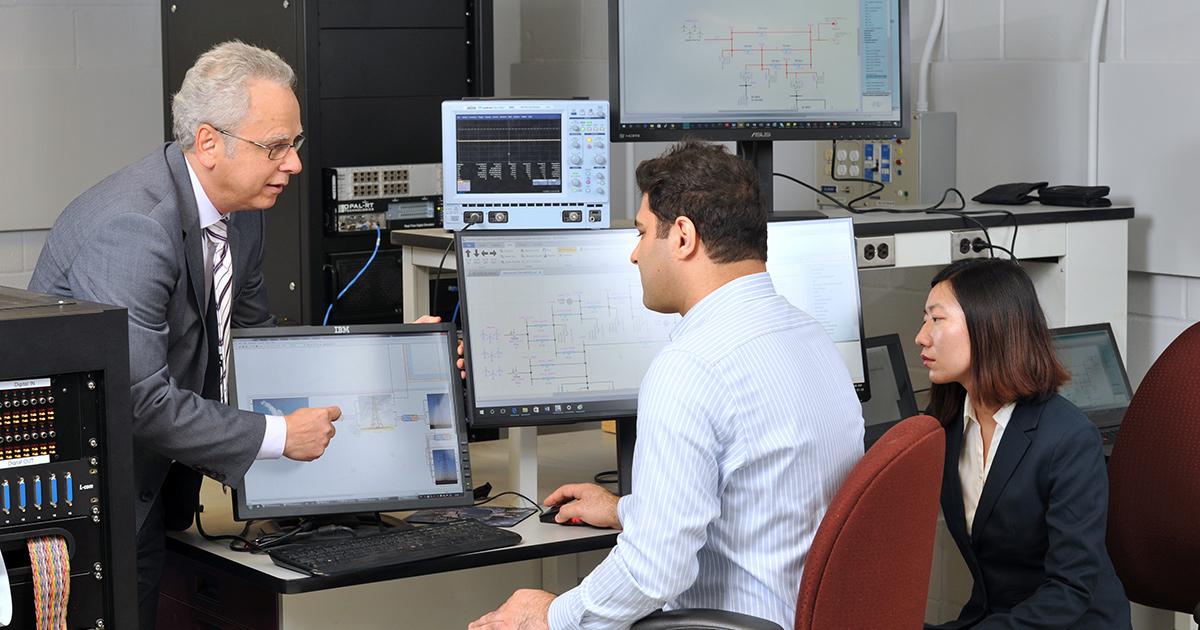Nouvelles
Polytechnique Montréal in the vanguard of research into transients in large-scale electric power systems
Professor Jean Mahseredjian of the Department of Electrical Engineering and his team, comprising students, research associates, professors and industry partners, are working on simulations of transient events in power transmission systems as part of an Industrial Research Chair (IRC).
The NSERC/Hydro-Québec/RTE/EDF/OPAL-RT Industrial Research Chair in Multi-Time-Frame Simulation of Transients for Large-Scale Power Systems is developing digital simulation methods for analyzing electrical signals that affect the operation of infrastructures for power transmission from generating stations to end users.
Transients are short-duration disturbances of electrical waves caused by natural phenomena (e.g., lightning, falling trees, geomagnetic storms) or technical events (e.g., switching of lines, short circuits, load fluctuations). They can result in equipment failure, load shedding, and even widespread outages.
The chair’s work will contribute to the understanding and mitigation of transients as well as optimized integration of renewable energy sources. The IRC benefits from $2.7 million in support from the Natural Sciences and Engineering Research Council of Canada (NSERC), Hydro-Québec, Réseau de transport d’électricité (RTE), Électricité de France (EDF) and OPAL-RT Technologies.
Jean Mahseredjian, professor in the Department of Electrical Engineering at Polytechnique Montréal and the chairholder, is a world-renowned authority in the specialized field of power-systems performance. As the designer and development director of a digital tool at Hydro-Québec’s research institute (IREQ) in the 1990s, and in his capacity as a researcher at Polytechnique since 2005, he has helped position Canada and Québec at the forefront of simulation and analysis of transients in large-scale power transmission networks. The innovative software that he designed is used today by electric utilities all over the world, including Hydro-Québec as well as France’s EDF and RTE.
“This chair provides us with one-of-a-kind resources for advancing our research in simulation of transients for large-scale power systems,” says Professor Mahseredjian. “The support of our industrial partners is a particularly motivating factor, and it allows our students to conduct work based on real-world problems and data.”
For his part, Christophe Guy, CEO of Polytechnique Montréal, notes: “The involvement of Professor Mahseredjian, his team, and the partners in the Industrial Research Chair will have a considerable impact on the advancement of knowledge and refinement of methods relative to simulation and analysis of transient phenomena in large-scale electrical networks. The breakthroughs that will be achieved through the co-operation of the diverse participants will confirm the pioneering roles of Canada and Québec in this field.”
And Bettina Hamelin, Vice President, Research Partnerships, NSERC, adds: “As an international leader in the field of transients in power systems, and with the strong ties he has forged with industry players, Professor Mahseredjian and his Industrial Research Chair program are taking science and engineering from the realm of the abstract to the concrete. Their work is making an important contribution to basic science, through the perfecting of next-generation simulation tools, while the partners are actually using the tools in the field.”
Leading-edge advances with substantial tangible benefits
One of the objectives of the IRC’s work is to establish a unified environment for real-time and offline computation, eliminating gaps between digital methods. This work also involves acceleration of digital methods, refinement of mathematical models, adaptation of operations based on changes occurring in transmission networks, and automation of processes for detection of potential problems. A further research interest of the chair is application of new high-performance computing methods in large database environments.
These initiatives will enable power system operators to enhance forecasting of disturbances while improving network performance, reliability and service quality. Those operators will also be able to make sophisticated use of infrastructure and equipment modelling tools to design more robust networks, especially useful for integration of renewable energy sources like wind farms and solar power plants.
“Hydro-Québec’s priority with this chair is to contribute to establishing a new generation of digital methods and mathematical models for achieving extremely precise, high-performance simulation of large-scale power systems,” explains Jérôme Gosset, General Manager of IREQ, Hydro-Québec’s research institute. “This will enable the utility to better deal with the increasing intermittencies and fluctuations affecting power systems, which are crucial aspects in network performance and reliability.”
David Landier, head of the Generating Stations division of Réseau de transport d’électricité’s Centre National d’Expertise Réseaux, in France, says: “Ambitious research activities are needed to meet the technological and societal challenges facing electric power transmission companies in the decades to come. In that context, the work of the Polytechnique research chair in simulation of transients for power systems will make decisive contributions to development of more precise, higher-performance simulation tools.”
A hub for training specialists in the study of transients
In addition, the Polytechnique Montréal IRC is a bona fide “turbine” for training top students and researchers who will go on to work for power-system operators as well as R&D companies active in the field. Six master’s students, nine PhD students and four post-doctoral students benefit from guidance and supervision from two research associates and several Polytechnique professors, as well as from the support of the institutional and industrial partners when conducting work based on real-world issues and data.
“This industrial research chair is an essential tool for developing the technology and specialized labour required for simulation and studies of networks leading to development of industrial products, optimization of networks, and integration of renewable energy systems,” says Jean Bélanger, President of OPAL-RT Technologies, a Montréal-based company that develops and commercializes real-time simulators used in the automotive, aviation, industrial systems and power systems markets.
The NSERC/Hydro-Québec/RTE/EDF/OPAL-RT Industrial Research Chair in Multi-Time-Frame Simulation of Transients for Large-Scale Power Systems will help maintain Canada and Québec in the forefront of digital methods for simulating transients in power systems infrastructures. As a result, system operators will be positioned to better serve their domestic and external markets, while solutions providers and consulting firms will be able to make design improvements to the power transmission networks of the future.


Professor Jean Mahseredjian with students in the laboratory of the NSERC/Hydro-Québec/RTE/EDF/OPAL-RT Industrial Research Chair in Multi-Time-Frame Simulation of Transients for Large-Scale Power Systems.
To learn more
Expertise profile of professor Jean Mahseredjian





